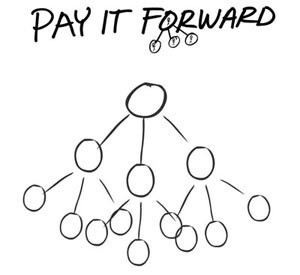By: David Ross
I’m sure we all can remember some point in our lives when we relied on the assistance of others as we progressed through an internship or job search. Even though we ultimately applied for those internship and job opportunities, interviewed for those positions and ultimately secured employment – at some point during the process someone else did us a favor. Whether referring us to a job opening, serving as a reference, agreeing to an informational interview or simply offering some advice, the kindness and generosity of others has helped all of us at some stage of our careers.
So I encourage you to “pay it forward” and consider how you can serve as a resource for others. If you are not able to directly hire or recommend someone for an opening, you can still be very helpful to those seeking opportunities in a variety of ways. In my experience, I have found people to be grateful for your time and willingness to offer your insight and advice. It may not seem like much and may take up time that could be spent doing other things, but you may be surprised how the time you do provide for others can be very helpful for them.
Don’t worry if you don’t have many influential contacts – something as simple as directing someone to the appropriate contact person or alerting someone to a new or upcoming internship or job opening you hear about can be extremely helpful. For those with busy schedules, it can be so easy to remain focused on our day-to-day routines and forget that other individuals may be searching for any tidbit of assistance we can provide. If you are unsure what assistance you can provide, I encourage you to take a moment to really think about some of the small things you can offer. For example, sharing your story and some of the lessons you’ve learned thus far can be very informative and illuminating for others.
Remember, at some point in the future you may seek someone else’s help as you transition from one position to the next. Who knows – someone that you help out now may “pay it forward” and be that person that returns the favor in the future.







